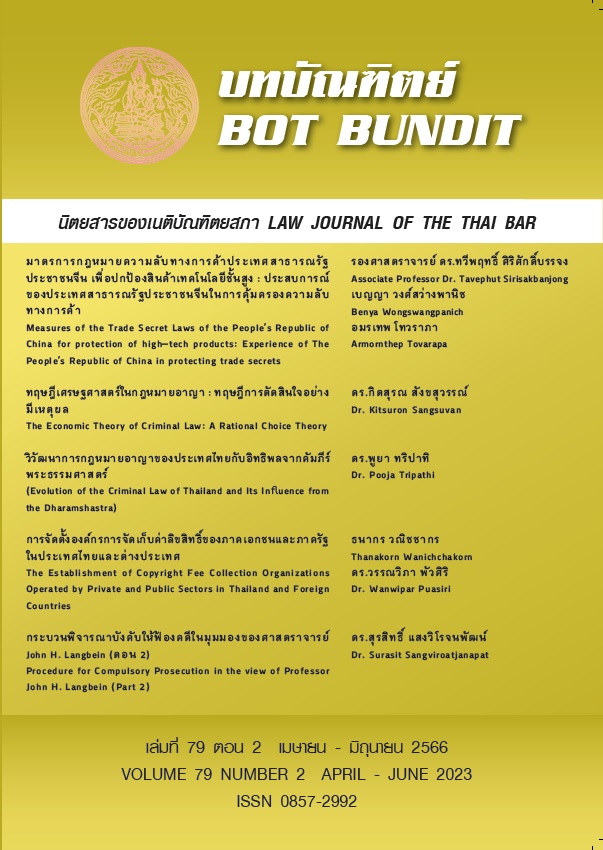ทฤษฎีเศรษฐศาสตร์ในกฎหมายอาญา : ทฤษฎีการตัดสินใจอย่างมีเหตุผล
Main Article Content
บทคัดย่อ
หลักเศรษฐศาสตร์ได้ถูกนำมาปรับใช้ในการวิเคราะห์กฎหมายอาญาและการกระทำความผิดอาญากันอย่างแพร่หลาย การใช้หลักเศรษฐศาสตร์ในการวิเคราะห์ดังกล่าวอาจช่วยทำให้เกิดความเข้าใจหรือเกิดมุมมองทางกฎหมายอาญาในรูปแบบใหม่ที่มีความลึกซึ้งมากกว่าเดิม การวิจัยนี้จึงมีวัตถุประสงค์ในการวิเคราะห์ว่าทฤษฎีทางเศรษฐศาสตร์หรือทฤษฎีการตัดสินใจอย่างมีเหตุผลสามารถนำมาปรับใช้กับการพิจารณาการกระทำความผิดและบทบัญญัติในประมวลกฎหมายอาญาได้หรือไม่ วิธีการวิจัยนี้ได้ใช้วิธีการวิจัยเชิงคุณภาพ โดยการรวบรวมข้อมูลต่าง ๆ จากหนังสือ บทความทางวิชาการ รายงาน บทบัญญัติประมวลกฎหมายอาญา และคำพิพากษา
การวิจัยพบว่าทฤษฎีการตัดสินใจอย่างมีเหตุผลอาจนำมาใช้ในการพิจารณาการกระทำความผิดตามประมวลกฎหมายอาญา แต่อย่างไรก็ตาม การใช้ดุลพินิจของศาลและบทบัญญัติบางมาตราในประมวลกฎหมายอาญาอาจเป็นอุปสรรคในการลงโทษผู้กระทำความผิดภายใต้ทฤษฎีการตัดสินใจอย่างมีเหตุผล นอกจากนี้ การวิจัยยังนำเสนอว่าศาลไทยควรใช้ทฤษฎีการตัดสินใจอย่างมีเหตุผลในการวินิจฉัยการกระทำความผิดอาญา อีกทั้งยังควรศึกษาและวิเคราะห์ทฤษฎีการตัดสินใจอย่างมีเหตุผลเพิ่มเติม และนำทฤษฎีการตัดสินใจอย่างมีเหตุผลมาใช้เป็นแนวทางในการลงโทษผู้กระทำความผิดหรือกำหนดไว้ใน “ยี่ต๊อก”
Article Details

อนุญาตภายใต้เงื่อนไข Creative Commons Attribution-NonCommercial-NoDerivatives 4.0 International License.
เอกสารอ้างอิง
ภาษาไทย
เกียรติขจร วัจนะสวัสดิ์, คำอธิบายกฎหมายอาญาภาค 1 (พิมพ์ครั้งที่ 6, สำนักพิมพ์มหาวิทยาลัยธรรมศาสตร์ 2540).
จิตติ ติงศภัทิย์, คำอธิบายประมวลกฎหมายอาญาภาค 1 (พิมพ์ครั้งที่ 8, สำนักอบรมศึกษากฎหมายแห่งเนติบัณฑิตยสภา 2529).
ทรงธรรม ปิ่นโต และคณะ, เศรษฐศาสตร์...เล่มเดียวอยู่ (ธนาคารแห่งประเทศไทย 2555).
ทุติยพงษ์ กิตติวัฒนานนท์, ‘ปัญหาการปล่อยตัวชั่วคราวในคดีอาญา : ศึกษากรณีการปล่อยตัวชั่วคราวโดยไม่มีหลักประกัน’ (2565) 1 วารสารกฎหมายนิติพัฒน์ นิด้า 76.
พิพัฒน์ จักรางกูร, คำอธิบายประมวลกฎหมายอาญาภาค 1 (นิติบรรณาการ, มปป.).
ภรณี เกราะแก้ว, ‘เล่าเรื่องคดีอาญา : การใช้ดุลพินิจในการรอการกำหนดโทษหรือการรอการลงโทษและเงื่อนไขในการคุมประพฤติจำเลย’ (2564) 1 วารสารนิติศาสตร์ มหาวิทยาลัยแม่ฟ้าหลวง 99.
วิภาพร เนติจิรโชติ, ‘การลงโทษเพื่อป้องกันอาชญากรรม’ (2564) 2 วารสารมนุษยศาสตร์และสังคมศาสตร์ มหาวิทยาลัยพะเยา 273.
วิวรรธน์ ดำรงค์กุลนันท์, ‘การรอการกำหนดโทษและการรอการลงโทษจำคุก : วัตถุประสงค์และข้อสังเกตบางประการ’ (2564) 2 วารสารรามคําแหง ฉบับนิติศาสตร์ 191.
สัญชัย สัจจวานิช, สัมมนาในวิชากฎหมายอาญา (พิมพ์ครั้งที่ 7, สำนักพิมพ์มหาวิทยาลัยรามคำแหง 2534).
หยุด แสงอุทัย, กฎหมายอาญาภาค 1 (พิมพ์ครั้งที่ 17, สำนักพิมพ์มหาวิทยาลัยธรรมศาสตร์ 2540).
ภาษาต่างประเทศ
Brent E. Turvey, Criminal Profiling: An Introduction to Behavioral Evidence Analysis (5th edn, Elsevier 2022).
Britannica Educational Publishing, Notable Economists (Britannica Educational Publishing 2013).
Chris Crowther, An Introduction to Criminology and Criminal Justice (Palgrave Macmillan 2007).
Chris Hale and others, Criminology (Third Edition, Oxford University Press 2013).
Daniel E. Hall, Criminal Law and Procedure (7th edn, Cengage 2015).
Framcos T. Cullen and Pamela Wilcox, The Encyclopedia of Criminological Theory (SAGE Publications, 2010).
Frank E. Hagan, Introduction to Criminology: Theories, Methods, and Criminal Behavior (6th edn, Sage Publications 2008).
Gary Kleck and Brion Sever, Punishment and Crime: The Limits of Punitive Crime Control (Routledge 2017).
Gary S. Becker, ‘Crime and Punishment: An Economic Approach’ (1968) 2 Journal of Political Economy 169.
Gary S. Becker, ‘Nobel Lecture: The Economic Way of Looking at Behavior’ (1993) 3 Journal of Political Economy 385.
Gennaro F. Vito, Jeffrey A. Maahs, and Ronald M. Holmes, Criminology: Theory, Research, and Policy (2nd edn, Jones and Bartlett Publishers 2007).
Harry R. Dammer and Jay S. Albanese, Comparative Criminal Justice Systems (5th edn, Cengage Learning 2013).
Henry Campbell Black, A Law Dictionary (2nd edn, The Law Book Exchange 1995).
James D. Gwartney, Richard Stroup, and J.R. Clark, Essentials of Economics (2nd edn, Academic Press 1985).
Jeremy Bentham, The Rationale of Punishment (Robert Heward 1830).
Joel Clarke Gibbons, Rethinking the Headlines: Studies in Law, Justice, and Society (Xlibris Corporation, 2009).
John H. Hoag and Arleen J. Hoag, Introductory Economics (4th edn, World Scientific 2006).
Joycelyn M. Pollock, Criminal Law (10th edn, Elsevier 2013).
Kevin Albertson and Chris Fox, Crime and Economics: An Introduction (Routledge 2012).
Larry J. Siegel, Criminology: The Core (7th edn, Cengage 2018).
Larry J. Siegel and John L. Worrall, Introduction to Criminal Justice (15th edn, Cengage Learning 2016).
Mark R. Pogrebin, About Criminals: A View of the Offenders’ World (2nd edn, SAGE Publications 2012).
Matt DeLisi and Peter J. Conis, American Corrections: Theory, Research, Policy, and Practice (2nd edn, Jones & Bartlett Learning 2013).
Matthew Lippman, Contemporary Criminal Law: Concepts, Cases, and Controversies (2nd edn, SAGE Publications 2010).
Michael J. Allen and Ian Edwards, Criminal Law (15th edn, Oxford University Press 2019).
Peter B. Kraska, John J. Brent and W. Lawrence Neuman, Criminal Justice and Criminology Research Methods (3rd edn, Routledge 2021).
Robert S. Siegler, Emerging Minds: The Process of Change in Children’s Thinking (Oxford University Press 1996).
Robin S. Engel and others, The Power to Arrest: Lessons from Research (Springer 2019).
Sunčica Nikola Vujić, Econometric Studies to the Economic and Social Factors of Crime (Tinbergen Institute Research Series 2009).


